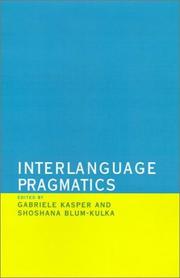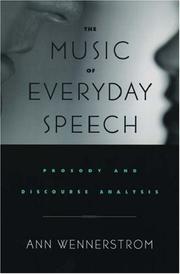| Listing 1 - 4 of 4 |
Sort by
|

ISBN: 1280525312 019536211X 1601297890 9781601297891 9780195362114 9780195066029 0195066022 9781280525315 9786610525317 6610525315 0195066022 0197721753 Year: 2023 Publisher: New York ; Oxford University Press,
Abstract | Keywords | Export | Availability | Bookmark
 Loading...
Loading...Choose an application
- Reference Manager
- EndNote
- RefWorks (Direct export to RefWorks)
This is a collection of essays on topics in a field which studies how non-native speakers and listeners use their deficient communicative competence to cope with a variety of communication tasks.
Interlanguage (Language learning) --- Pragmatics. --- Speech acts (Linguistics) --- Illocutionary acts (Linguistics) --- Speech act theory (Linguistics) --- Speech events (Linguistics) --- Language and languages --- Linguistics --- Speech --- Pragmalinguistics --- General semantics --- Logic, Symbolic and mathematical --- Semantics (Philosophy) --- Language acquisition --- Languages, Mixed --- Philosophy --- Study and teaching

ISBN: 1280471743 1423738012 019535222X 1602563292 0195125746 9780195125740 9781423738015 9786610471744 6610471746 9780195352221 0197722784 Year: 2023 Publisher: New York : Oxford University Press,
Abstract | Keywords | Export | Availability | Bookmark
 Loading...
Loading...Choose an application
- Reference Manager
- EndNote
- RefWorks (Direct export to RefWorks)
This innovative work provides the first comprehensive account of general extenders (""or something,"" ""and stuff,"" ""or whatever""). Combining insights from linguistics, cognitive psychology, and interactional sociolinguistics, the author demonstrates that these small phrases are not simply vague expressions, but have a powerful role in making interpersonal communication work. The audience for this book includes linguists, scholars of English, teachers of English as a first and a second language, sociolinguists, psycholinguists, and communications researchers.
English language --- Interpersonal communication. --- Speech acts (Linguistics) --- Conversation analysis. --- Pragmatics. --- Pragmalinguistics --- General semantics --- Language and languages --- Logic, Symbolic and mathematical --- Semantics (Philosophy) --- Analysis of conversation --- CA (Interpersonal communication) --- Conversational analysis --- Oral communication --- Illocutionary acts (Linguistics) --- Speech act theory (Linguistics) --- Speech events (Linguistics) --- Linguistics --- Speech --- Communication --- Interpersonal relations --- Colloquial English --- Spoken English --- Discourse analysis. --- Spoken English. --- Philosophy --- Germanic languages
Book
ISBN: 3110672618 3110672464 Year: 2023 Publisher: Berlin ; Boston : De Gruyter Mouton,
Abstract | Keywords | Export | Availability | Bookmark
 Loading...
Loading...Choose an application
- Reference Manager
- EndNote
- RefWorks (Direct export to RefWorks)
Hate speech has been extensively studied by disciplines such as social psychology, sociology, history, politics and law. Some significant areas of study have been the origins of hate speech in past and modern societies around the world; the way hate speech paves the way for harmful social movements; the socially destructive force of propaganda; and the legal responses to hate speech. On reviewing the literature, one major weakness stands out: hate speech, a crime perpetrated primarily by malicious and damaging language use, has no significant study in the field of linguistics. Historically, pragmatic theories have tended to address language as cooperative action, geared to reciprocally informative polite understanding. As a result of this idealized view of language, negative types of discourse such as harassment, defamation, hate speech, etc. have been neglected as objects of linguistic study. Since they go against social, moral and legal norms, many linguists have wrongly depicted those acts of wrong communication as unusual, anomalous or deviant when they are, in fact, usual and common in modern societies all over the world.The book analyses the challenges legal practitioners and linguists must meet when dealing with hate speech, especially with the advent of new technologies and social networks, and takes a linguistic perspective by targeting the knowledge the linguist can provide that makes harassment actionable.
Hate speech. --- Oral communication --- Speech acts (Linguistics). --- Social aspects. --- Applied Linguistics. --- Forensic Linguistics. --- Hate Speech. --- Illocutionary acts (Linguistics) --- Speech act theory (Linguistics) --- Speech events (Linguistics) --- Language and languages --- Linguistics --- Speech --- Oral transmission --- Speech communication --- Verbal communication --- Communication --- Defamation against groups --- Group defamation --- Group libel --- Racist speech --- Speech, Hate --- Libel and slander --- Philosophy

ISBN: 0195302761 1433700778 9786610531325 0195349504 1280531320 0198032714 1602564442 9780195349504 9780195143218 0195143213 9780195143225 0195143221 9781280531323 9780195302769 6610531323 0197722059 Year: 2023 Publisher: New York ; Oxford University Press,
Abstract | Keywords | Export | Availability | Bookmark
 Loading...
Loading...Choose an application
- Reference Manager
- EndNote
- RefWorks (Direct export to RefWorks)
Recently there has been growing interest among discourse analysts in incorporating the crucial element of prosody into the analysis of spoken language. This volume considers the role of prosody on a variety of discourse genres.
Prosodic analysis (Linguistics) --- Discourse analysis. --- Speech acts (Linguistics) --- Illocutionary acts (Linguistics) --- Speech act theory (Linguistics) --- Speech events (Linguistics) --- Language and languages --- Linguistics --- Speech --- Discourse grammar --- Text grammar --- Semantics --- Semiotics --- Multidimensional phonology --- Polysystemic phonology --- Prosodic phonology --- Speaking styles --- Grammar, Comparative and general --- Phonetics --- Philosophy --- Phonology --- Discourse analysis --- 802.0-56 --- 802.0-6 --- 802.0-6 Engels: prosodie; metrum; accent --- Engels: prosodie; metrum; accent --- 802.0-56 Engels: syntaxis; semantiek --- Engels: syntaxis; semantiek --- Prosodic analysis (Linguistics). --- Speech acts (Linguistics).
| Listing 1 - 4 of 4 |
Sort by
|

 Search
Search Feedback
Feedback About UniCat
About UniCat  Help
Help News
News